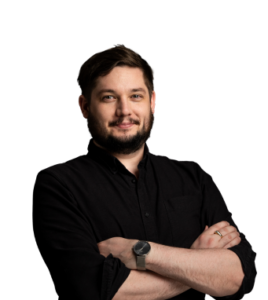On September 24, a world-class group of scientists from biotech, pharma, and academia will present the latest research findings and new technologies that are driving the design, discovery, and development of new drugs — from small molecules and monoclonals to RNA therapeutics and gene-editing technologies.
The ACS Media Group spoke to a few of the presenters ahead of time to gain insight on what they think is new and exciting in current research, including one of our keynote speakers, Amgen’s Alexander “Sasha” Kamb, who has successfully led Amgen’s discovery research program since 2011. His focus: Unlocking the potential of biology to treat patients with serious illnesses.
Keynote Q&A
 Before becoming vice president of research for Amgen, Kamb built the company’s Genome Analysis Unit, which explores applications for next-gen sequencing across all disease areas. He also has worked extensively with neuroscience and oncology research groups, both with Amgen and Novartis. Read on hear his take on the complexities and opportunities in today’s drug development landscape.
Before becoming vice president of research for Amgen, Kamb built the company’s Genome Analysis Unit, which explores applications for next-gen sequencing across all disease areas. He also has worked extensively with neuroscience and oncology research groups, both with Amgen and Novartis. Read on hear his take on the complexities and opportunities in today’s drug development landscape.
C&EN: There’s been a revolution in genomic “next-gen” sequencing over the past few years. How do you see this technology impacting pharmaceutical R&D?
Kamb: The revolution in ultra-high-throughput sequencing will provide several benefits to medicine. First, it can be used as an adjunct to drug discovery through human genetic approaches, such as to pinpoint new drug targets and therapeutically important biological mechanisms. It’s also an enabler of higher success rates in the clinic, especially through the exploitation of targets with strong human genetic validation and genome-based assignment of responder/non-responder subsets.
Biological drugs are expected to dominate prescription drug sales by 2020. As head of research discovery for the world’s largest independent biotechnology firm, what is driving this trend?
Kamb: Large-molecule biotechnology is a less mature, and therefore a less thoroughly explored modality when compared with small-molecule drug discovery. Thus, new applications continue to emerge. In addition, the modular nature of proteins facilitates the design of multi-functional molecules, such as bi-functional antibodies. Furthermore, molecular diversity is more readily accessible through protein engineering. As one example, much of the screening/optimization of a large-molecule inhibitor can be achieved by simply immunizing an animal with the target to produce an antibody.
Twenty years ago, you led the team at Myriad Genetics that identified the BRCA1 breast cancer gene. What are your thoughts on the Supreme Court’s ruling last year that isolated human genes cannot be patented?
Kamb: The decision will likely have little negative impact in a practical sense on progress in genetic medicine, because the world is moving inexorably toward whole genome-based DNA sequence in the diagnostic setting; if anything, it will reinforce this trend.
Thank you to Dr. Kamb for taking the time to speak with us, and for participating in this event! Tab through below for quick profiles of other speakers, and visit us online for additional Q&A’s with these leaders in the field.
As the head of antibacterial discovery for the Novartis Institutes for BioMedical Research (NIBR), Jennifer Leeds, Ph.D., is on a constant hunt for new ways to address unmet medical needs among patients with severe infections. Her mission is a challenging one: To identify safe and effective new chemical entities against deadly bacterial targets. In pursuit of this goal, she and her team harness knowledge spanning bacterial physiology and genetics, biochemistry and lead discovery, clinical microbiology, and a range of new technologies for understanding antibacterial compound structure and activity relationships.
More at: http://www.bioconferencelive.com/ics_files/InterviewwithJenniferLeeds.pdf Fiona Marshall, Ph.D., founded Heptares Therapeutics, one of the UK’s leading biotechnology companies, with Malcolm Weir in 2006. She now leads a team of 60 scientists at Heptares, which is pioneering a structure – based drug design approach to GPCRs and building a broad pipeline of novel medicines. Marshall’s work has contributed to the development of drugs for asthma, schizophrenia, heart disease and Parkinson’s disease.
More at: http://www.bioconferencelive.com/ics_files/InterviewwithFionaMarshall.pdf” In his role as CSO for Ensemble Therapeutics, Nick Terrett heads up the firm’s drug discovery program investigating the rapid synthesis of macrocycles using DNA – programmed chemistry, as drug candidates for disease relevant protein – protein and protease targets.
More at: http://www.bioconferencelive.com/ics_files/InterviewwithNickTerrett.pdf” ]


















